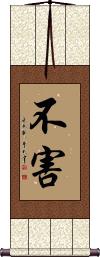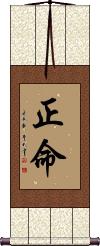Many custom options...
And formats...

Do No Harm in Chinese / Japanese...
Buy a Do No Harm calligraphy wall scroll here!
Personalize your custom “Do No Harm” project by clicking the button next to your favorite “Do No Harm” title below...
Do No Harm / Harmless
5. Right Living / Right Livelihood / Perfect Livelihood
Samyag Ajiva / Samma Ajiva
正命 (right living) is one of the Noble Eightfold Paths of Buddhism.
Right Living, along with Right Speech and Right Action, constitute the path to Virtue.
Right Living means that a Buddhist should only take a job or pursue a career in a field that does no harm. Buddhists should not work in the arms trade, as pimps or in the field of prostitution, as a butcher or in a shop that kills or sells meat, in a laboratory that does animal research, or in any other business that involves scheming or unethical behavior.
Another definition: Avoidance of professions that are harmful to sentient beings, such as slaughterer, hunter, dealer in weaponry or narcotics, etc.
This term is exclusively used by devout Buddhists. It is not a common term, and is remains an unknown concept to most Japanese and Chinese people.
See Also: Buddhism | Enlightenment | Noble Eightfold Path
Not the results for do no harm that you were looking for?
Below are some entries from our dictionary that may match your do no harm search...
| Characters If shown, 2nd row is Simp. Chinese |
Pronunciation Romanization |
Simple Dictionary Definition |
無損 无损 see styles |
wú sǔn wu2 sun3 wu sun muson |
to do no harm (to something); intact; (computing) lossless no injury |
賊 贼 see styles |
zéi zei2 tsei zoku ぞく |
More info & calligraphy: Rebel / Insurgent(1) thief; robber; burglar; (2) rebel; insurgent; traitor A thief, robber, spoiler; to rob, steal, etc. |
不害 see styles |
bù hài bu4 hai4 pu hai fugai ふがい |
More info & calligraphy: Do No Harm / Harmlessahiṃsā. Harmlessness, not injuring, doing harm to none. |
毒蛇 see styles |
dú shé du2 she2 tu she dokuja; dokuhebi どくじゃ; どくへび |
More info & calligraphy: Vipervenomous snake; poisonous snake A poisonous snake.; Poisonous snakes, the four elements of the body— earth, water, fire, wind (or air)— which harm a man by their variation, i. e. increase and decrease. Also, gold. |
仇 see styles |
qiú qiu2 ch`iu chiu kiyuu / kiyu きゆう |
spouse; companion (n-suf,n) (1) rival; opponent; adversary; competitor; enemy (esp. one with which there is longstanding enmity); foe; (2) revenge; (3) (archaism) spouse; (out-dated or obsolete kana usage) (1) foe; enemy; rival; (2) resentment; enmity; grudge; (3) harm; injury; (surname) Kiyū |
傷 伤 see styles |
shāng shang1 shang shō きず |
to injure; injury; wound (1) wound; injury; cut; gash; bruise; scratch; scrape; scar; (2) chip; crack; scratch; nick; (3) flaw; defect; weakness; weak point; (4) stain (on one's reputation); disgrace; dishonor; dishonour; (5) (emotional) hurt; hurt feelings To injure, wound, hurt, harm, distress, A tr. of yakṣa. |
妨 see styles |
fáng fang2 fang hokken ほっけん |
to hinder; (in the negative or interrogative) (no) harm; (what) harm (personal name) Hokken to hinder |
害 see styles |
hài hai4 hai gai がい |
to do harm to; to cause trouble to; harm; evil; calamity injury; harm; evil influence; damage hiṃsā; vihiṃsā; hurt, harm, injure. |
弊 see styles |
bì bi4 pi minegawa みねがわ |
detriment; fraud; harm; defeat (1) (rare) bad habit; harm; (prefix) (2) (humble language) (See 弊社) my; our; (personal name) Minegawa Worn out, reduced to extremities, corrupt, deceptive; my, mine. |
損 损 see styles |
sǔn sun3 sun takuji たくじ |
to decrease; to lose; to damage; to harm; (coll.) to ridicule; to deride; (coll.) caustic; sarcastic; nasty; mean; one of the 64 hexagrams of the Book of Changes: ䷨ (n,adj-na,vs,vi) (1) loss; damage; harm; unprofitable; (noun or adjectival noun) (2) disadvantage; handicap; drawback; unfavorable; (personal name) Takuji To spoil, hurt, damage. |
毒 see styles |
dú du2 tu doku どく |
poison; to poison; poisonous; malicious; cruel; fierce; narcotics (1) poison; toxicant; (2) (See 目の毒・めのどく・1,毒する・どくする) harm; evil influence; (3) ill will; spite; malice; (4) (abbreviation) abusive language Poison. |
蠱 蛊 see styles |
gǔ gu3 ku maji まじ |
arch. legendary venomous insect; to poison; to bewitch; to drive to insanity; to harm by witchcraft; intestinal parasite (1) (archaism) (See 蠱物) charmed and cursed; (2) something that bewilders; something that leads one astray; the work of demons spell |
誤 误 see styles |
wù wu4 wu go ご |
mistake; error; to miss; to harm; to delay; to neglect; mistakenly (n,n-pref) mistake; error deceit |
讐 仇 see styles |
chóu chou2 ch`ou chou muneoka むねおか |
variant of 讎|雠[chou2] (1) foe; enemy; rival; (2) resentment; enmity; grudge; (3) harm; injury; (personal name) Muneoka |
鎩 铩 see styles |
shā sha1 sha |
(old) spear; lance; (literary) to cripple; to harm; to injure |
不妨 see styles |
bù fáng bu4 fang2 pu fang fubō |
there is no harm in; might as well unobstructed |
他害 see styles |
tā hài ta1 hai4 t`a hai ta hai tagai たがい |
(noun/participle) harming others to harm others |
何妨 see styles |
hé fáng he2 fang2 ho fang |
what harm is there in (doing something) |
侵す see styles |
okasu おかす |
(transitive verb) (1) to invade; to raid; to violate (airspace, etc.); to intrude; to trespass; (transitive verb) (2) to infringe; to encroach; (transitive verb) (3) (See 冒す・おかす・2) to harm; to afflict; to affect |
倶害 see styles |
jù hài ju4 hai4 chü hai kugai |
to bring harm to both [self and others] |
傷命 伤命 see styles |
shāng mìng shang1 ming4 shang ming shōmyō |
Injury to life. |
傷害 伤害 see styles |
shāng hài shang1 hai4 shang hai shougai / shogai しょうがい |
to injure; to harm (noun, transitive verb) injury; inflicting bodily injury |
免る see styles |
manogaru まのがる |
(v2r-s,vi) (archaism) (See 免れる・1) to escape from harm; to be spared |
冒す see styles |
okasu おかす |
(transitive verb) (1) to brave; to risk; to face; to venture; (transitive verb) (2) (of a disease, chemical, etc.) to harm; to afflict; to affect; (transitive verb) (3) to desecrate; to profane; (transitive verb) (4) to assume (someone else's surname); to take |
加害 see styles |
jiā hài jia1 hai4 chia hai kagai かがい |
to injure (noun/participle) assault; violence; damaging (someone) to harm |
危害 see styles |
wēi hài wei1 hai4 wei hai kigai きがい |
to harm; to jeopardize; to endanger; harmful effect; damage; CL:個|个[ge4] injury; harm; danger endangering |
呪う see styles |
majinau まじなう |
(Godan verb with "u" ending) (1) (kana only) to pray that one avoids disaster or illness; (Godan verb with "u" ending) (2) (kana only) to pray for harm or death to come upon someone; to curse; (Godan verb with "u" ending) (3) (kana only) (See まじない) to charm; to conjure; to cast a spell (on someone); (Godan verb with "u" ending) (4) (archaism) to treat illness (with a prayer) |
壞處 坏处 see styles |
huài chu huai4 chu5 huai ch`u huai chu |
harm; troubles; CL:個|个[ge4] |
大害 see styles |
taigai; daigai たいがい; だいがい |
heavy damage; great harm |
実害 see styles |
jitsugai じつがい |
real harm; actual damage |
Click here for more do no harm results from our dictionary
The following table may be helpful for those studying Chinese or Japanese...
| Title | Characters | Romaji (Romanized Japanese) | Various forms of Romanized Chinese | |
| Do No Harm Harmless | 不害 | fu gai / fugai | bù hài / bu4 hai4 / bu hai / buhai | pu hai / puhai |
| 5. Right Living Right Livelihood Perfect Livelihood | 正命 | sei myou / seimyou / sei myo | zhèng mìng zheng4 ming4 zheng ming zhengming | cheng ming chengming |
Successful Chinese Character and Japanese Kanji calligraphy searches within the last few hours...





